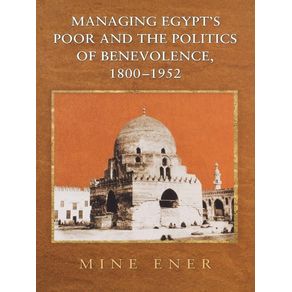This richly textured social history recovers the voices and experiences of poor Egyptians--beggars, foundlings, the sick and maimed--giving them a history for the first time. As Mine Ener tells their fascinating stories alongside those of reformers, tourists, politicians, and philanthropists, she explores the economic, political, and colonial context that shaped poverty policy for a century and a half. While poverty and poverty relief have been extensively studied in the North American and European contexts, there has been little research done on the issue for the Middle East--and scant comprehensive presentation of the Islamic ethos that has guided charitable action in the region. Drawing on British and Egyptian archival sources, Ener documents transformations in poor relief, changing attitudes toward the public poor, the entrance of new state and private actors in the field of charity, the motivations behind their efforts, and the poors use of programs created to help them. She also fosters a dialogue between Middle Eastern studies and those who study poverty relief elsewhere by explicitly comparing Egypts poor relief to policies in Istanbul and also Western Europe, Russia, and North America. Heralding a new kind of research into how societies care for the destitute--and into the religious prerogatives that guide them--this book is one of the first in-depth studies of charity and philanthropy in a region whose social problems have never been of greater interest to the West.

